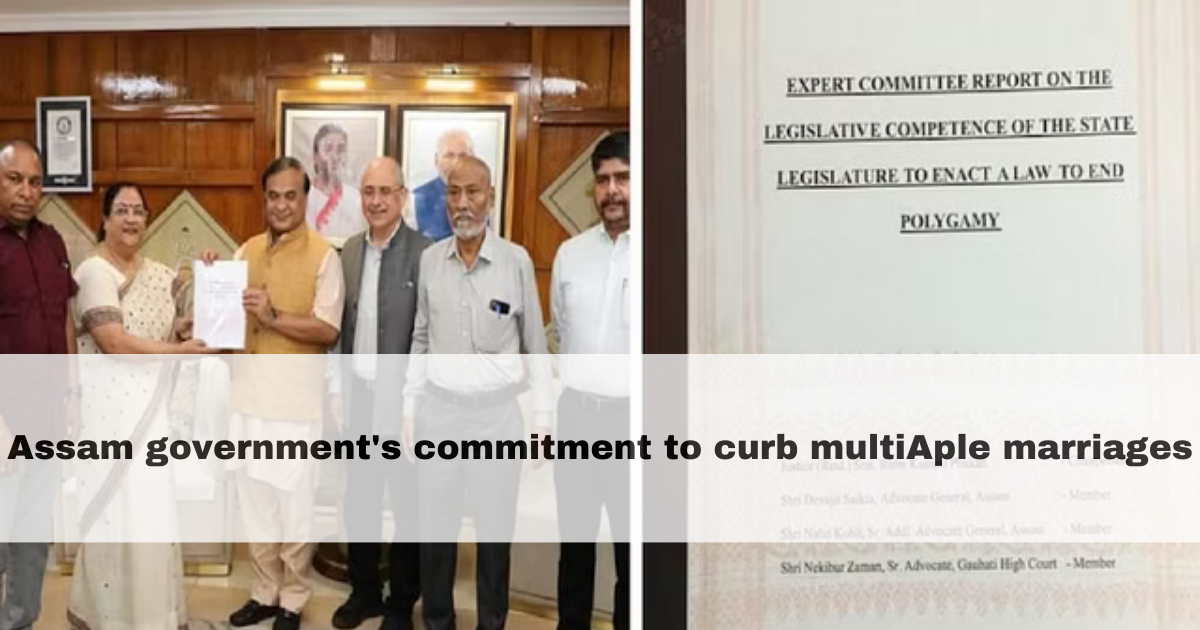Assam A Bill to prohibit polygamy will be introduced this fiscal year, Assam Chief Minister Himanta Biswa Sarma announced on Sunday, hours after an expert committee’s report on the state’s ability to do so was submitted.
Speaking at a press conference at this location, he said that the expert committee, which had earlier in the day delivered its findings, had unanimously agreed that the state could create its own laws to outlaw polygamy.
“The study unanimously concluded that the state government had the authority to enact polygamy legislation. Such a law can be passed by the state legislature, he noted.
Sarma noted that the panel had specified that the President, not the Governor, must grant the Bill his or her assent.
“The committee has noted that the Muslim law makes no reference to age. We can thus introduce state law with the exact requirements as those in the POCSO Act to eliminate the inconsistency with it, he continued.”
The chief minister responded in the affirmative when asked if Assam would introduce a law to outlaw polygamy.
The measure would undoubtedly be implemented during this fiscal year, he stressed.
According to Sarma, it will be decided whether the relevant Bill will be introduced at the Assembly’s upcoming September session, December session, or budget session.
As a similar law has never been presented in Assam, we would need to give the MLAs some time to debate this bill. In our Cabinet meeting, we will make a decision, he continued.
The situation would be different, according to the chief minister, if the Uniform Civil Code (UCC) went into effect before the state’s anticipated polygamy law.
He responded, “There is not much need to take the opinion of groups and social organizations because we have the pulse that Hindu, Muslim, Buddhist, and all other communities have accepted our effort.
“There is no justification to object. However, there is no issue if the Cabinet decides to consider the viewpoints of all parties since we have time for that.” Few people are opposed to this move.
The government’s plan to pass a polygamy law was previously criticized by the opposition parties as divisive and communal, especially at a time when the Law Commission is currently accepting proposals regarding the UCC.
The expert committee established by the Assam government to assess whether the state legislature was capable of passing a bill to outlaw polygamy delivered its findings to the chief minister earlier in the day.
On Twitter, Sarma shared photographs of the review’s cover and the panel individuals giving him the report.
May you like : Which meditation is highly effective? | “कौन सा ध्यान बहुत शक्तिशाली है?”
The expert committee turned in its report today. Regardless of caste, creed, or religion, Assam is now getting closer to developing a supportive environment for women’s empowerment, he continued.
Sarma announced the creation of the four-person expert group on May 12 under the leadership of Justice (Ret.) Rumi Kumari Phukan.
The committee also includes senior additional advocate general Nalin Kohli, senior advocate Nekibur Zaman, and state advocate general Devajit Saikia in addition to Phukan.
The committee’s mandate was extended by the Assam government on July 18 with effect from July 13 to August 12.
The underlying cutoff time for the advisory group to present its discoveries was 60 days.
Its task was to examine the Muslim Personal Law (Shariat) Act of 1937’s provisions in accordance to the Directive Principles of State Policy for a Uniform Civil Code, as well as Article 25 of the Constitution.
Sarma claimed that on July 13, the Assam government informed the relevant parties that it supported the UCC and sought to outlaw polygamy right away in the state.
Parliament would decide on the UCC, but the state might potentially make a decision with the President’s approval, he had noted.

Thanks for great info I was looking for this information for my mission.
Your article helped me a lot, is there any more related content? Thanks!
Thanks for magnificent information I was looking for this information for my mission.